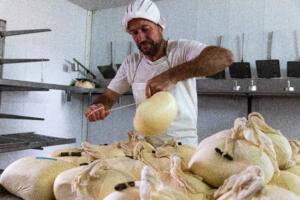Starting the Action Plan of our “Pilot farm” project
The Action Plan of our “Pilot Farm in Sustainable Agriculture” project gets under way

We are launching, with the technical support of The Regen Academy, the Action Plan of the “Pilot farm in sustainable agriculture” project, with the aim of supporting the S’Ullestrar farm in Ciutadella in its transition towards the organic certification of the farm and gradually achieve environmental and economic sustainability of the farm. The medium-term objective is to work together to ensure that the farm can serve as a “pilot farm” from which to expand and perfect methodologies and knowledge and, at the same time, to encourage other conventional farms that would like to begin this process. It should be noted that both the Action Plan and the technical work to be carried out by The Regen Academy have partial funding from CaixaBank through the ‘Convocatoria de Medioambiente 2023’, which promotes projects aimed at improving natural heritage through the protection of biodiversity, environmental innovation, circular economy and rural development.
“Menorca Preservation had set out to find a conventional farm that had participated in MENORCA PRESERVADA, and that wanted to make a transition towards more environmentally sustainable practices but at the same time strengthen the economic viability of the farm. The aim is to learn together and create a pilot farm from which to identify which initiatives work best to help the primary sector become more resilient to climate change, and at the same time improve the economic viability of their farms,” explains our Executive Directior, Rebecca Morris, also adding that: “Jordi and Carme de S’Ullestrar attended a large part of our free training programme for farmers MENORCA PRESERVADA, so when they expressed to us their interest in transitioning to organic farming, having taken over their farm from the next generation, we offered to accompany them in this process, supporting them not only financially but also on a technical level thanks to the support of The Regen Academy.”
The project has focused on two very specific phases: firstly, an initial diagnosis of the farm to understand the type of management, production, soil quality and economic viability of the farm, among other issues. Secondly and consequently, a 3-year Action Plan in which objectives and implementation proposals have been agreed for the development of these sustainable practices leading to obtaining organic certification, which includes the implementation and monitoring of results, soil analysis, economic viability by product, KPIs, etc. All of this includes technical support from The Regen Academy to farmers during the process.
From Finca S’Ullestrar, Carme Bosch adds that: “For us, being part of this project is a great opportunity, because although it is true that we have worked in the countryside all our lives, attending the training sessions has helped us to see that we are still repeating the models we have always seen, and that apart from this model there are other ways of working the countryside to be more sustainable while remaining profitable. That is when fears arise, the fear of change, the fear of not doing it well, and that is why the technical and economic support has been the push we needed to take action and to be able to respond to the challenges that lie ahead so that our small business can be maintained over time. Hopefully our experience will encourage other colleagues to commit to change, and thus make Menorca a model island in terms of sustainable management of agriculture and landscape. It sounds utopian, but the truth is that we are very close to it, because luckily here the primary sector is kept alive and genuine as in few places in the world, far from macro farms and large areas of monoculture. It is everyone’s job to look after it, support it and help maintain it”.
The environmental objectives expected to be achieved through the initiative include: increased resilience to the risk of droughts and floods by increasing the percentage of organic matter in the soil; the generation of fertile soil and Co2 capture through physico-chemical and microbiological soil analysis; the promotion of biodiversity; and, fundamentally, providing the necessary knowledge and experience to all farm members for the implementation and maintenance of sustainable techniques on their farm.
